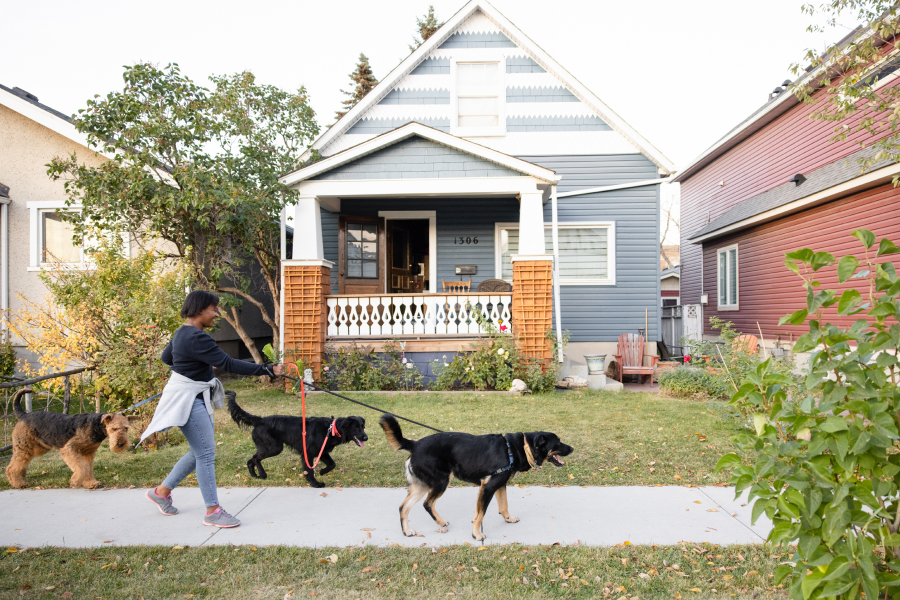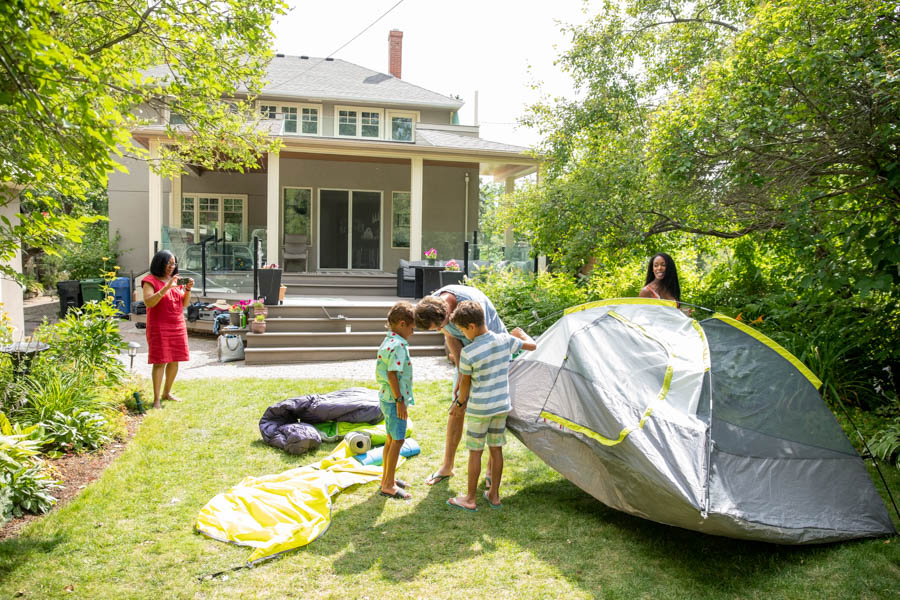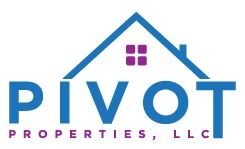Budgeting for your first home? Try these tips for boosting your savings.

To make the leap from renter to homeowner, you’ll need to save, or have already started saving, for a down payment. A down payment is typically between 3% and 20% of the purchase price of a home, but if you’re like the median successful buyer, your down payment might be anywhere between 10% and 19%. That may feel overwhelming if you’re just starting out, but setting up a budget and finding creative ways to save money over time can help. A 2022 Zillow study found that 63% of recent buyers who obtained a mortgage used savings for at least part of their down payment.
The exact amount you save every month will depend on how much you expect to spend on a down payment — if you’re stuck, don’t hesitate to talk to a lender. They can help you break down the numbers, and once you’ve pick an estimated moving date, you can calculate your necessary savings from there.
If you already have a designated monthly savings bucket, that’s a great start. Of course, the more you’re able to put away, the faster you’ll reach your savings goals for your home. Here are 21 ideas to help make that happen.
1. Get a side hustle

If you’re willing to put in a little more work on the weekends or in the evening after your day job, a side gig offers numerous creative ways to save and earn more money. You could try dog-walking, babysitting, waiting tables or house-sitting. You can even tap into an artistic hobby, selling handmade crafts either online or to co-workers and friends.
“A side hustle doesn’t have to take up a lot of time,” says Bill Promes, a financial planner at Austin Creek Capital in Mill Valley, California. “When you introduce a new source of income that has a specific purpose, it’s easier to stay on track.”
2. Cut out your commute or car payment and save on gas

If you currently drive to work alone, consider other options that might be available. That might mean relying on public transportation if it’s available where you live. If that’s not an option, try carpooling, biking or asking your employer if you can work at home at least a few days each week. When you get creative with your commuting, you can relocate those expenses to your home down payment savings.
If your commuting expenses are unusually high, it might be worth it to consider looking for a job that enables you to work remotely or shorten your commute. With that being said, if you plan to buy a home within the next two years, you may want to check with your loan officer before changing jobs. A recent career move or switch to self-employment could hurt your ability to be approved for a mortgage.
If having a car is the only option for you and you spend a lot of money every month to pay off your car loan, take a look at your finances. Consider buying a cheaper vehicle for cash if that’s feasible for you. Of course, this largely depends on how much you rely on your car, and it’s important to pay attention to gas mileage. You don’t want to swap out your current car for a gas guzzler that will cost you more money.
It’s also important to make sure you’re not buying a car that would end up costing you even more than your previous car. If you get into a cycle of constantly repairing your car, you won’t be able to save up enough money for a down payment.
3. Pay off debt when you can

If you get a bonus or find that you have extra savings to spend, consider putting it towards your debt.
It may seem counterintuitive to pay off debt so you can save money for a mortgage, but paying off debt with a high annual percentage rate (APR) can help you boost your down payment savings by lowering or eliminating your monthly interest expense. The more debt you pay off, the more interest expense you’ll free up to save for your home down payment.
4. Consider a capsule wardrobe

No matter the season, it’s always a good time to do a little spring cleaning. Challenging yourself to focus on a minimalist wardrobe may inspire you to buy less and only invest in the items you really need. Plus, you can sell the clothes you don’t wear, which could help you make money that you can then use for your down payment, and declutter your space. A number of online sites — like Depop, Poshmark and ThredUp — can help make this process easier. Or, you can drop off goods for sale at a local consignment shop or throw together a garage or yard sale that could help you rake in cash.
5. Restore and resell

If you have some refurbishing experience, talent or interest in the creative arts, consider this creative way to make and save money: restoring secondhand furniture. While you’re selling your unwanted belongings on online marketplaces, look for opportunities to purchase used furniture at a low price, spruce it up by reupholstering or painting, and then resell it at a profit. While it’s definitely not one of the easier options when it comes to making some extra cash, you can rely on online tutorials to help you get started.
6. Buy used instead of new

Whether you’re looking to buy clothes or furniture, try to buy second-hand goods or join a “Buy Nothing” group where you can swap goods with people in your neighborhood. Whether you’re looking online or at a thrift shop in person, you might be surprised by what you’ll find for free or at a discounted rate.
7. Don’t buy things you don’t need

Before making a nonessential purchase, do an “edit” of your home, closet or garage to make sure you’re not buying something you already have, don’t need, or, in the case of clothing, may not wear often enough to justify. Unsubscribe from automated purchases and email lists that encourage you to buy things you may not need.
8. Limit your spending with the “cash-stuffing” approach

Limit your spending with “cash-stuffing,” an approach that went viral on social media and is also known as the “envelope system.” To use it, put set amounts of cash into envelopes marked with different spending categories on the first day of each month. When an envelope is empty, you can’t spend any more for that category until the next month. Cash leftover? Carry it over to the next month or reallocate it as money toward your down payment.
9. Save your credit card rewards

If you’re a responsible credit card user, consider applying for cash-back rewards cards and saving that cash for your house down payment.
Research your credit card programs to learn more about how you can use your credit card rewards to your advantage. For example, credit card points can go towards airline miles, which can help you cut down on or eliminate spending on plane tickets.
10. Cut down on travel

Eliminate any unnecessary travel until you feel like you’ve saved enough money for your down payment. While this doesn’t seem fun — and it might mean cutting down on a well-deserved vacation — reconsidering extraneous travel plans is a great way to cut down on unnecessary costs and save money. If you don’t want to cut out vacations altogether, look for a happy middle ground. Perhaps consider a shorter or cheaper trip, going away for less time and using credit card points instead of cash.
According to a recent buyer survey conducted in 2022 by Zillow researchers, 41% of prospective buyers canceled their vacation plans to save money for a down payment on a home.
11. Automate your savings and use a high-yield savings account

Treat your savings goal like a monthly bill. Set up an automatic transfer from your checking account into your down payment savings account. Automatic savings are easier to stick with, and allocating your income to a separate account lowers the temptation to spend it.
Take it to the next level and get creative with the way you save.
A high-yield savings account, bank certificates of deposit (CDs) or certain Treasury bonds can help you supercharge your savings with higher interest rates than a regular savings account. Your savings will grow as money sits in your account.
“There are some rules to be aware of, but overall, Series I Treasury Bonds are an amazing location for some of your cash and especially a house down payment fund,” says Jovan Johnson, co-owner of Piece of Wealth Planning in Decatur, Georgia. “And, the interest is taxed only at the Federal level.” Interest on other types of savings may be taxed at the state level, as well. That takes a second bite out of your returns.
12. Downsize your housing

Although it might be a tough decision, downsizing your current space may help you put away more money each month for the down payment on your future home. According to a buyer survey conducted by Zillow researchers in 2022, about one in five (21%) prospective buyers lived in a smaller home than desired in an effort to save money. If you can move from a one-bedroom apartment to a studio or from a rental house to a smaller rental apartment, your savings may add up quicker than you think.
The added costs will shrink, too. “Getting a smaller place will allow you to save on rent and utilities,” says Ryan Graves, president of Bemiston Asset Management in St. Louis, Missouri. “A smaller space also requires fewer things to fill it up, again saving you money. When the time comes, it’s also a lot easier to move from a small place to a larger one, filling it up over time,” he said.
13. Get a roommate

Living alone is a luxury, and you can cut down on your cost of living by adding roommates to the mix. Taking on even one additional person can cut your rent in half. If you really want to commit to cutting costs and feel comfortable with this option, think about if you have a family member or friend who would temporarily let you live with them in exchange for helping with house maintenance or other tasks.
14. Cancel subscriptions

Do you really need twelve different streaming services? Do you have apps or subscriptions you can live without? Try cutting back to just one streaming service. In Zillow’s 2022 survey of prospective buyers, about one-third (33%) reported canceling subscriptions for streaming, cable and even internet and phone, to help put away more money toward a down payment. These savings may be much more doable than you imagine.
15. Borrow from your local library

Libraries have so many free resources, and utilizing them can help you save money that you can put towards a down payment. Next time you want to buy a book, consider going to your local library to see if they have it in stock first.
Some libraries go beyond books, though, letting cardholders borrow unique items. At select St. Louis Public Library locations, for example, you can rent fishing poles, tackle boxes and telescopes. Check out your local library. You might be surprised to find out what they offer.
16. Cut your monthly costs

Everyday essentials, like cell phone bills, Internet services and car insurance, are necessary items to budget for. With that being said, these bills present opportunities to save by shopping around for the best deals.
“Maybe you’re overpaying for auto insurance, or your provider doesn’t offer many discounts,” Johnson says. “Or maybe you could weather a higher deductible for a year or two to lower your monthly premium.”
17. Buddy up for accountability

Saving isn’t easy, but you don’t have to do it alone. Communicating with your partner or a friend creates a sense of accountability as you work towards your savings goals. Make regular dates to discuss your savings with your friend or partner. You can cheer each other on while you plan your monthly budgets and find ways to save money together. Don’t forget to track your progress and celebrate your “wins.”
18. Look for wallet-friendly entertainment alternatives

Going to happy hour after work or a movie on the weekend is certainly fun, but cutting back on extracurriculars is an easy way to pocket more cash. Instead of going out, opt for a fun movie night at home or invite friends over for a game night.
Eating out often can also become an expensive habit. If you work out of an office, instead of buying lunch, try to bring your lunch to work. Grocery shopping and making your own lunch at home can be done cheaply, too. Find recipes for budget-friendly meals online.
You won’t be alone in your saving journey. According to a 2022 Zillow survey, about half (48%) of prospective buyers cut back on entertainment, including dining out, concerts, and movies, in order to save for a down payment. Want a bonus trick to spending less? Schedule spend-free weekends. For one weekend each month, try not to spend a single dollar. You might be surprised by how much you can save.
19. Take advantage of community resources

Believe it or not, there are free activities all around you, no matter where you live. Make a list or calendar filled with free or low-cost entertainment ideas. You don’t need to spend money to have fun. Consider playing games at a local park, meet a friend for a walk or take a free yoga or exercise class.
20. Save your tax refund

It can be tempting to spend your tax refund right after you receive it. But consider saving it to go toward your home down payment.
If you receive a refund when you file your income tax returns, add that lump sum to your savings. Alternatively, you can use it to make an extra payment toward your highest APR debt. The more you save, the more interest income you can earn. The more debt you eliminate, the less interest expense you’ll pay.
21. Ask for cash gifts

Consider starting a down payment fund as part of your wedding registry, or ask for cash gifts in place of birthday presents or gifts for other occasions. This is a great way to build up your savings throughout the year or when big life events roll along. Just under one-third (27%) of successful buyers last year helped finance their down payment using gifts from family and friends, according to Zillow research. You can also use crowdfunding sites to announce your gift request and share your goal and progress on social media. Keep in mind that, depending on your loan type, lenders may want to see a “gift letter”. This documents where your gift funds came from and verifies they are a gift and not a loan. Hang on to copies of checks or bank statements to show your lender.
As you’re saving, research down payment assistance
Certain types of mortgages and home buyers qualify for down payment assistance programs. Local government agencies or nonprofits typically fund these programs, which can be grants or loans. Ask your real estate agent or mortgage lender for details, or search the Down Payment Resource Center.
Before you settle on a target amount to save for a home down payment, make an appointment to talk with a real estate agent and a home mortgage lender.
“Begin your conversations with a mortgage lender as early as possible,” says Shane Sideris, managing partner at Synchronous Wealth Advisors in Manhattan Beach and Santa Barbara, California. “A lender will be able to tell you about different loan options, some of which may allow you to put very little or zero down if you qualify.”
While you’re saving, continue to browse homes for sale online and update your needs, wants and wish lists. You may be able to find — and buy — the home of your dreams much sooner than you expect.

